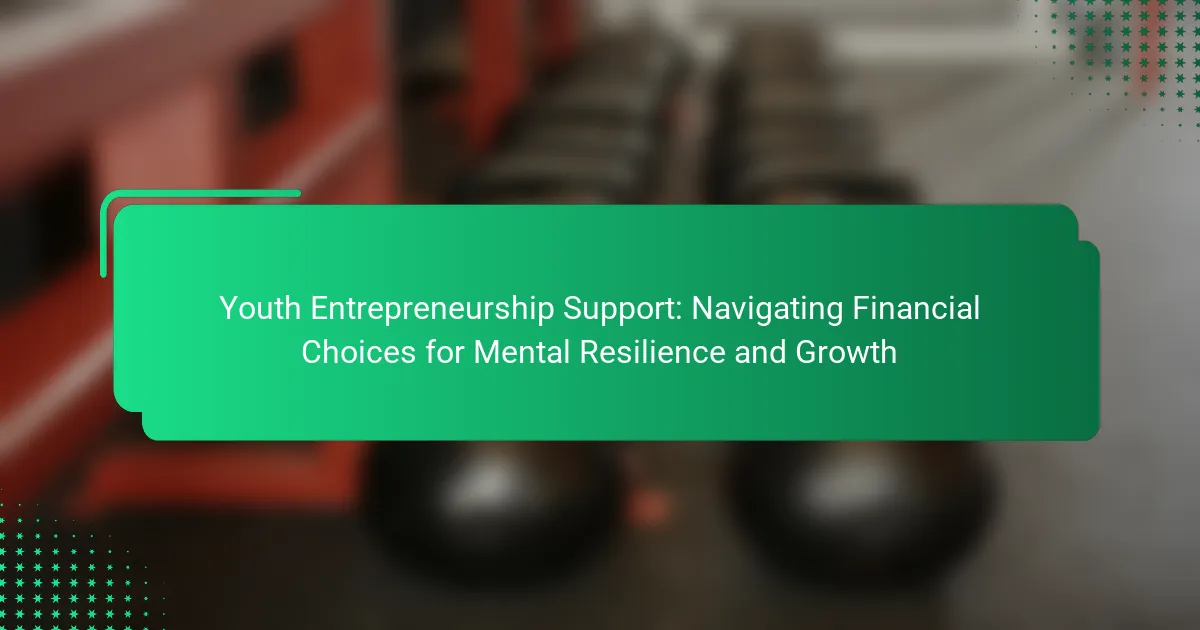Youth entrepreneurship support is crucial for navigating financial choices that enhance mental resilience and promote growth. Young entrepreneurs face challenges such as limited access to capital, inadequate financial literacy, and cash flow management difficulties. Effective financial strategies, mentorship, and emotional intelligence training can empower them to build resilience and make informed decisions. Best practices like budgeting and saving further contribute to their success in the entrepreneurial landscape.
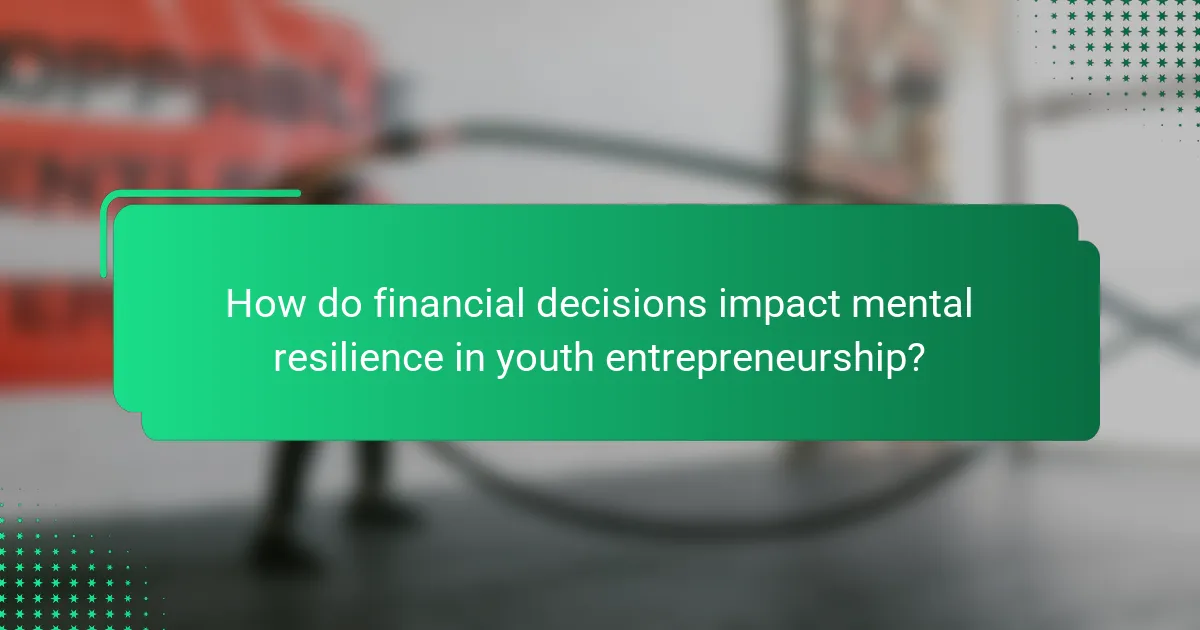
How do financial decisions impact mental resilience in youth entrepreneurship?
Financial decisions significantly influence mental resilience in youth entrepreneurship by shaping stress levels and confidence. Positive financial management fosters a sense of control, enhancing resilience. Conversely, poor financial choices can lead to anxiety, impacting overall growth. Studies indicate that 70% of young entrepreneurs report financial literacy as crucial for confidence. Empowering youth with financial knowledge strengthens their ability to navigate challenges, promoting both mental resilience and entrepreneurial success.
What are the psychological effects of financial stress on young entrepreneurs?
Financial stress significantly impacts young entrepreneurs’ mental health, leading to anxiety and reduced motivation. Prolonged financial strain can result in feelings of inadequacy and burnout. Research indicates that 70% of young entrepreneurs experience stress related to financial instability, affecting their decision-making and overall well-being. Developing financial literacy and access to support networks can mitigate these psychological effects, fostering resilience and promoting growth.
How does financial literacy influence mental well-being in youth?
Financial literacy significantly enhances mental well-being in youth by empowering them to make informed financial decisions. This knowledge reduces anxiety related to financial uncertainty and fosters a sense of control over their economic futures. Studies show that financially literate youth experience lower stress levels and improved self-esteem, which are critical for mental resilience. Moreover, understanding financial concepts helps youth develop problem-solving skills, contributing to personal growth and better coping strategies in challenging situations.
What skills are essential for financial literacy?
Essential skills for financial literacy include budgeting, saving, investing, and understanding credit. These skills empower youth entrepreneurs to make informed financial choices, fostering mental resilience and growth. Budgeting helps track income and expenses, while saving builds a safety net for unexpected costs. Investing allows for wealth accumulation over time, and understanding credit is crucial for accessing resources. Developing these skills enhances decision-making and promotes sustainable entrepreneurship.
How can young entrepreneurs develop these skills?
Young entrepreneurs can develop essential skills through targeted training, mentorship, and practical experience. Engaging in workshops fosters financial literacy, while mentorship provides guidance and networking opportunities. Practical experience, such as internships or starting small projects, enhances problem-solving and resilience. Research shows that 70% of young entrepreneurs who participate in mentorship programs report improved decision-making skills. Prioritizing these avenues supports mental resilience and growth in their entrepreneurial journey.
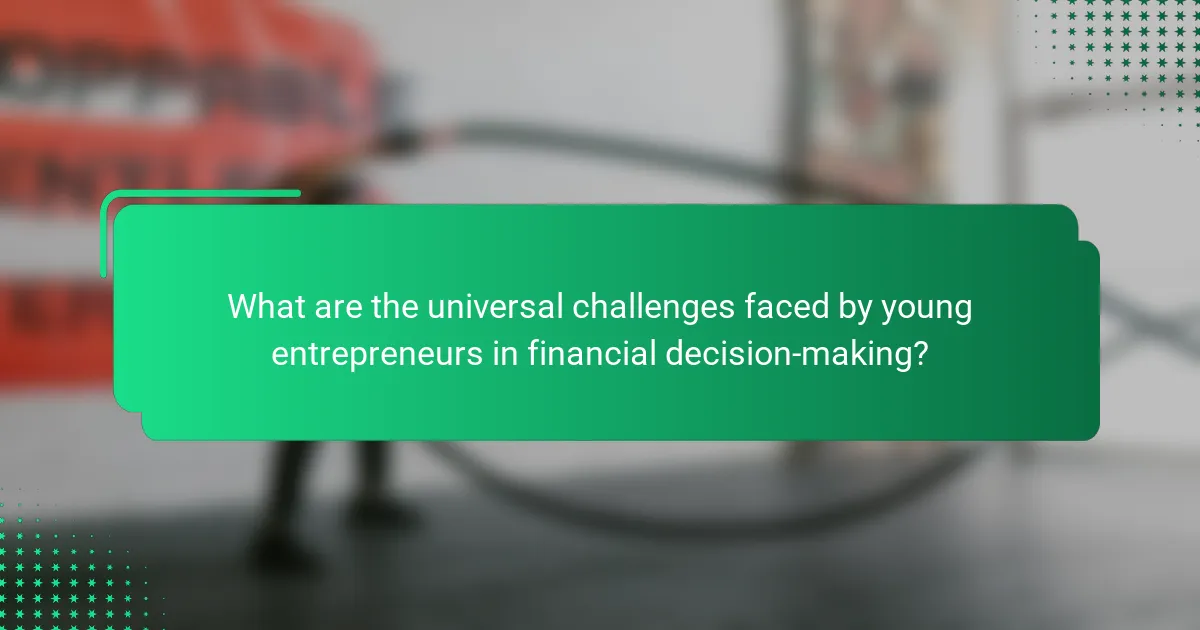
What are the universal challenges faced by young entrepreneurs in financial decision-making?
Young entrepreneurs face several universal challenges in financial decision-making, impacting their growth and mental resilience. These challenges include limited access to capital, inadequate financial literacy, cash flow management difficulties, and the pressure of making informed investment choices.
Access to capital is often constrained by a lack of credit history or collateral, making it difficult for young entrepreneurs to secure funding. Inadequate financial literacy can lead to poor budgeting and investment decisions, further exacerbating financial instability. Cash flow management is critical; many young entrepreneurs struggle to balance income and expenses, which can hinder their ability to sustain and grow their businesses. Additionally, the pressure to make informed investment choices can be overwhelming, as young entrepreneurs may lack experience and guidance in evaluating opportunities.
Addressing these challenges is essential for fostering a supportive environment for youth entrepreneurship, enabling them to make sound financial decisions and build resilience.
How do societal expectations shape financial choices?
Societal expectations significantly influence financial choices among youth entrepreneurs. These expectations shape attitudes toward risk-taking, investment, and resource allocation. For instance, peer pressure can drive young entrepreneurs to pursue high-cost ventures, impacting their financial stability. Additionally, societal norms around success may lead to prioritizing short-term gains over long-term growth, affecting mental resilience. Understanding these dynamics is crucial for fostering sustainable entrepreneurship.
What role does peer pressure play in financial decisions?
Peer pressure significantly influences financial decisions among youth, often leading to impulsive spending or investment choices. Social dynamics can pressure young entrepreneurs to conform to peer expectations, impacting their financial resilience. For instance, the desire to fit in may drive them to overspend on trends or lifestyle choices. As a result, understanding peer pressure’s role is crucial for developing sound financial strategies and promoting mental resilience in youth entrepreneurship.
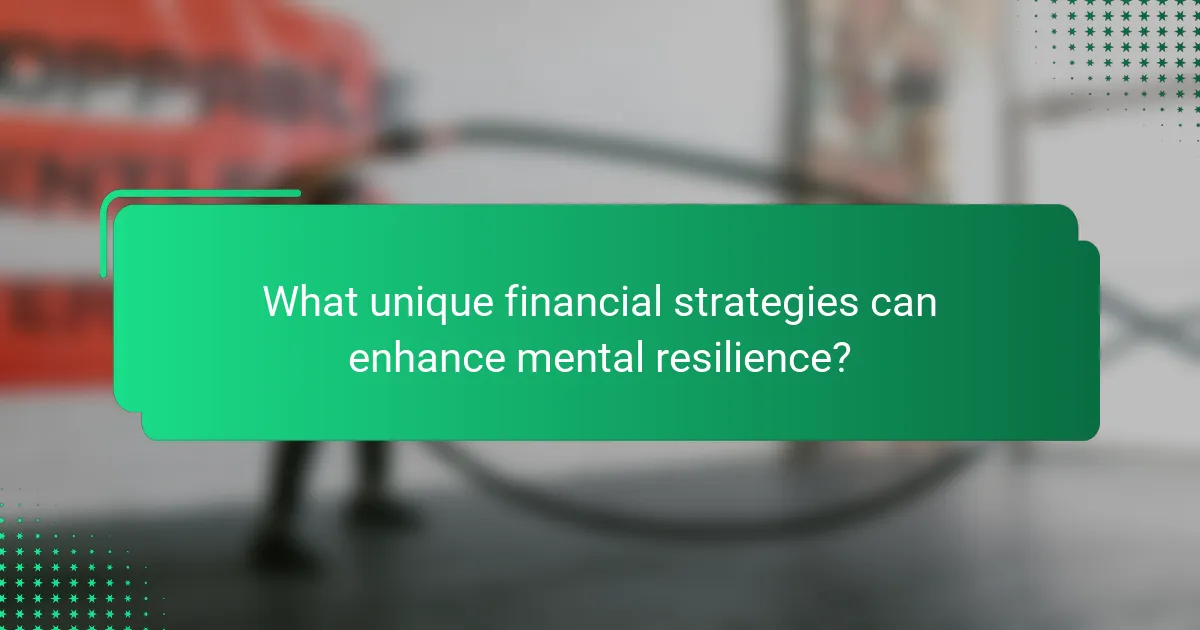
What unique financial strategies can enhance mental resilience?
Youth entrepreneurship can enhance mental resilience through unique financial strategies. These strategies include budgeting for unexpected expenses, diversifying income sources, and leveraging community resources. Establishing a financial safety net helps reduce stress and fosters a growth mindset. Additionally, investing in personal development and networking can provide emotional support and mentorship, further strengthening resilience.
How can budgeting techniques support mental health?
Budgeting techniques can enhance mental health by fostering financial stability and reducing stress. These techniques empower youth entrepreneurs to make informed financial choices, promoting resilience. For instance, creating a budget helps track expenses, ensuring resources align with goals. This clarity reduces anxiety about financial uncertainty. Additionally, setting savings goals cultivates a sense of achievement, boosting confidence and mental well-being. Overall, effective budgeting supports both financial growth and emotional stability in youth entrepreneurship.
What innovative funding options are available for youth entrepreneurs?
Youth entrepreneurs can explore innovative funding options like grants, crowdfunding, and microloans. Grants provide non-repayable funds, often targeted at specific projects. Crowdfunding allows youth to raise capital through online platforms, tapping into community support. Microloans offer small amounts of credit with flexible repayment terms, catering to young business owners. These options enhance financial resilience and foster growth in youth entrepreneurship.

What rare but impactful financial decisions can influence long-term success?
Investing in mentorship and emotional intelligence training can significantly impact long-term success in youth entrepreneurship. These rare financial decisions foster mental resilience, enabling young entrepreneurs to navigate challenges effectively. Mentorship provides guidance and networking opportunities, while emotional intelligence training enhances interpersonal skills crucial for business growth. Research indicates that entrepreneurs with strong emotional intelligence are more likely to succeed, as they can adapt to change and manage stress. Prioritizing these aspects not only supports immediate business needs but also builds a foundation for sustainable growth.
How does the choice of business model affect financial stress?
The choice of business model significantly influences financial stress for youth entrepreneurs. A sustainable model can alleviate pressure by ensuring steady cash flow and reducing uncertainty.
Traditional models, like retail, may incur higher overhead costs, leading to increased financial stress. In contrast, digital models often have lower startup costs and can adapt quickly to market changes.
Research indicates that businesses with flexible models report 30% less financial stress. This flexibility allows for adjustments in response to economic conditions, enhancing resilience.
Ultimately, selecting the right business model is crucial for mental well-being and growth in youth entrepreneurship.
What are the psychological benefits of investing in personal development?
Investing in personal development fosters mental resilience and growth, enhancing self-awareness and emotional intelligence. These psychological benefits lead to improved decision-making and adaptability in financial choices. Personal development cultivates a growth mindset, encouraging youth entrepreneurs to embrace challenges and learn from setbacks. As a result, they become more confident and capable of navigating complex financial landscapes, ultimately supporting their entrepreneurial journey.
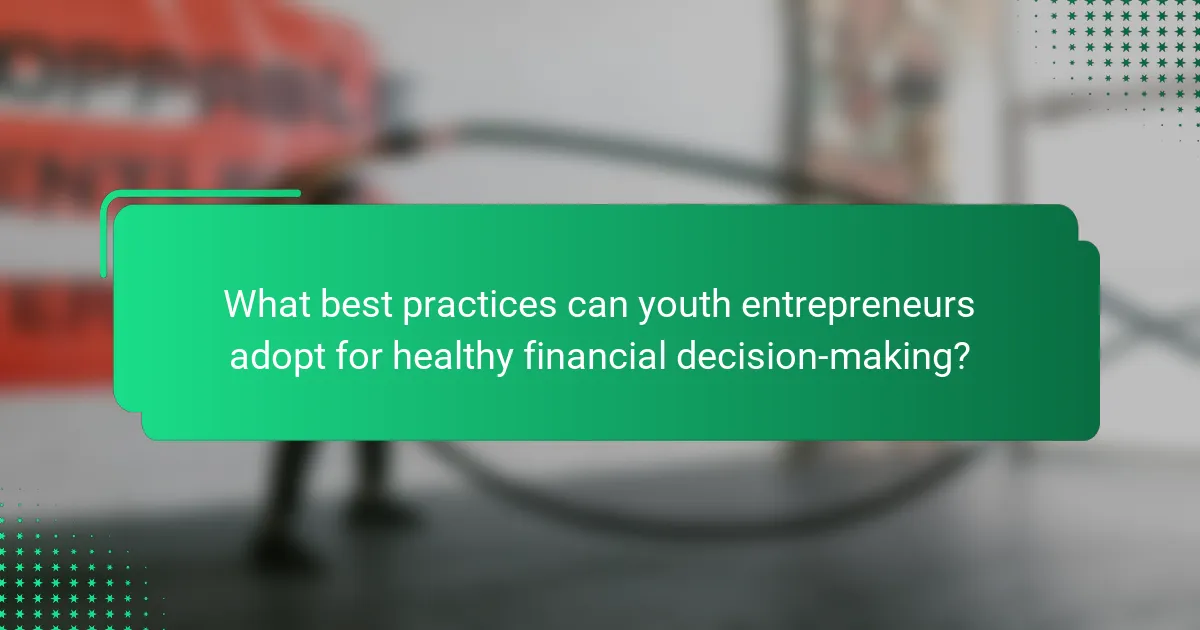
What best practices can youth entrepreneurs adopt for healthy financial decision-making?
Youth entrepreneurs can adopt several best practices for healthy financial decision-making. First, they should create a detailed budget to track income and expenses. This helps in understanding cash flow and making informed choices. Second, they must prioritize saving by setting aside a portion of their earnings regularly. This fosters financial security and prepares them for unexpected costs. Third, seeking mentorship from experienced entrepreneurs can provide valuable insights into effective financial strategies. Lastly, utilizing financial tools and apps can streamline budgeting and expense tracking, enhancing overall financial awareness.
How can setting realistic financial goals improve mental health?
Setting realistic financial goals can significantly enhance mental health by reducing stress and fostering a sense of control. When young entrepreneurs set achievable financial targets, they experience less anxiety related to their business decisions. This clarity promotes mental resilience, enabling them to focus on growth and innovation. Studies indicate that individuals with clear financial objectives report higher satisfaction and lower levels of depression. By aligning financial aspirations with personal values, youth can cultivate a positive mindset, ultimately leading to improved mental well-being.
What common mistakes should young entrepreneurs avoid in their financial journey?
Young entrepreneurs should avoid overspending, neglecting budgeting, underestimating cash flow, and ignoring financial education. These mistakes can hinder growth and mental resilience.
1. Overspending on unnecessary expenses can deplete resources quickly.
2. Neglecting budgeting leads to poor financial oversight and decision-making.
3. Underestimating cash flow can result in cash shortages during crucial times.
4. Ignoring financial education limits understanding of key financial principles.
Addressing these common pitfalls fosters a stronger financial foundation for sustainable growth.
What expert insights can guide youth in navigating financial choices effectively?
Expert insights can empower youth to make informed financial choices that enhance mental resilience and foster growth. Key strategies include developing a budget, understanding credit, and seeking mentorship.
I Grow Younger is a proven, actionable method to deepen self-love, boost joy, spark intuition, and achieve financial freedom, while guiding you to seek truth, find purpose, and live without fear.
1. **Budgeting**: Create a realistic budget to track income and expenses, ensuring financial stability and reducing stress.
2. **Credit Education**: Learn about credit scores and responsible borrowing to make informed decisions about loans and credit cards.
3. **Mentorship**: Engage with experienced entrepreneurs for guidance and support, leveraging their insights to navigate challenges effectively.
4. **Continuous Learning**: Stay informed about financial trends and investment opportunities to adapt strategies as needed.
These insights help youth build a strong foundation for financial success and mental well-being.
